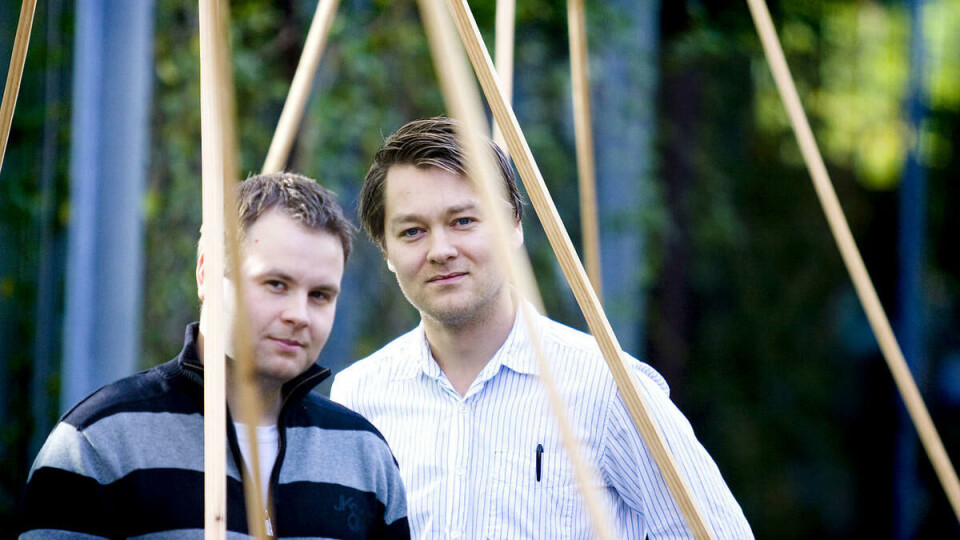
The end of the saga
Icelandic students in Norway fear that they will have to break off their studies and travel home due to the financial crisis. Withdrawals from Icelandic bank accounts have now been blocked by Norwegian ATMs.
In a short space of time, Iceland has gone from competing with Norway in being the best country in the world to live in, to becoming one of the poorest countries in Europe.
– If the crisis gets any worse, then I will have to move home, says Helgi Einarsson, a student at the Oslo School of Architecture and Design (AHO).
And Einarsson is not alone. Due to the Icelandic krone being severely weakened, things could get very difficult for Icelandic exchange students in Norway. There have been examples of students that only have what is left in their kitchen cupboards and 50 Norwegian kroner to live off for the rest of the month, according to an Icelandic radio station.
Narrowly missed the downturn
Icelandic students are in many cases dependent upon travelling abroad in order to complete higher degrees, as these are often not offered in their native country. There are currently 245 Icelandic students in Norway.
Sveinn Thorarinnsson, who is doing his second year of architecture at AHO, has chosen to take his entire education in Norway. When he and his family moved from Iceland last autumn, they sold the house. Thorarinnsson is happy about this today. He emphasizes that it would be very difficult to leave Iceland now, considering the current economic climate.
Einarsson does however have a flat and a mortgage in Iceland, where his girlfriend lives. He came to Norway in August to take a master’s degree in Landscape Architecture. In addition to paying for the mortgage, he is also renting on the private market in Oslo. He can now no longer afford this, and is therefore dependent on finding somewhere to live through Student Housing.
– It is not easy for us to pay for two homes. I would rather break off my studies than sell the house, Einarsson says.
– You wouldn’t be able to sell the house anyway! Thorarinnsson exclaims.
Trying to find solutions
Special Adviser to the Minister of Education, Science and Culture, Arna Hauksdottir, can state that there was a crisis meeting between the Association of Icelandic Students Abroad (SINE), and representatives from the Ministry of Education, Science and Culture, the Ministry of Foreign Affairs, and the Ministry of Social Affairs and Social Security, as well as the Central Bank and the Icelandic Student Loan Fund.
– Previously, the problem has been that Icelandic students were not able to transfer money from the banks in their native country at all. We have opened up for the transfer of money, so that students have full access to their student loan. According to the Central Bank of Iceland, transfers have been made possible during the last few days, and this will continue to work. Icelandic students abroad have also been told who they can contact in case of an emergency, Hauksdottir says.
In order to help students abroad get by, the Icelandic Student Loan Fund has decided to increase the loan given to students in other countries.
– The loan that Icelandic students abroad receive is currently higher in Icelandic kroner. At this time, it is too soon to state whether this will have an effect when students are to repay the loan. This is dependent upon the currency’s development, and this problem is being followed closely, and will be examined when things have calmed down, Hauksdottir states.
She assures that they are now doing all they can to speed up this process.
Thorarinnsson and Einarsson are worried that their student loans will be difficult to pay back thanks to the exchange rates. However, they are optimistic with regards to finding work in the future, as they have some years left of their education.
– Besides, I can probably buy a house for half the amount that I sold mine for, so I hope that I will be lucky. But I will stay wherever the jobs are, Thorarinnsson states.
Worst for exchange students
Steinar Holden, professor at the Department of Economics at the Faculty of Social Sciences at the University of Oslo (UiO), thinks that the financial situation of Icelandic students will depend on how they finance their studies.
– Icelandic students that are financially dependent on their home country and have student loans in Iceland will really notice the financial crisis. However, the same will not be true of Icelandic students that get their student loan from the Norwegian State Educational Loan Fund, he says.
Holden points out that students who are dependent upon short-term financial support, will notice this to a greater extent than those who are receiving long-term support.
– The situation is worst for the exchange students. They are starving today. It is not as bad for those of us who are going to stay for a long time, Sveinn Thorarinnson states.
Iceland is a special case
Steinar Holden thinks that Iceland is a special case, and that most other foreign students in Norway that are from other European countries will not experience the financial crisis to any great extent.
Holden explains that Iceland’s financial problems are connected to the fact that they have bought up banks in other countries. The banks have had total assets that have been worth many times more than Iceland’s gross domestic product. The Icelandic state has not been big enough to be able to save the banks, as has been done in cases like this in other countries. The crisis has lead to the Icelandic krone being weakened, and the Icelandic currency has greatly decreased in value.
– There are some similarities between the financial crisis in the US and the one in Iceland, but in America, the problems have been connected to mortgages, while in Iceland the problems are due to their buying up banks in other countries, Steinar Holden states.
Thorarinnson is delighted that he no longer has a house and a mortgage in Iceland, but the financial crisis has not passed unnoticed.
– Two weeks ago, I had a solid foundation of savings. They no longer exist. Or in any case, it is impossible to get them out of the country, and the exchange rates have meant that they are now worth a third of what they were, he says.
Both Thorarinnson and Einarsson fear that the impending rise in inflation in Iceland will hit the country very hard.
– When Iceland runs out of supplies and they have to start importing goods at three times the price, we will see the consequences, Thorarinnson says.
Both fear that many companies will be bankrupted, and that people will lose their jobs.
– We now have a situation that our children and grandchildren will have to pay for. I fear that this will be a long-term problem, a worried Thorarinnson states.
Can affect Norwegian students abroad
According to Holden, the financial crisis might also affect Norwegian students abroad.
– The exchange rate for the Norwegian krone has been weakened, and interest rates in Norway might also be affected, he says.
The financial crisis can also have an effect on the daily lives of Norwegian students at home as well.
– If interest rates on mortgages increase, then all Norwegians who have bought houses will be affected by this. However, the result may just as well be lower interest rates. We will also probably notice a rise in unemployment, although this will not be a severe rise.
Meanwhile, both Thorarinnson and Einarsson believe that the crisis might also have some benefits.
– Now one is learning what is important in life. You do not need an SUV and an iPhone so long as you have a roof over your head and fish in the sea, Thorarinnson says.
– Besides, it is always the big crises that have driven the world forwards.
































